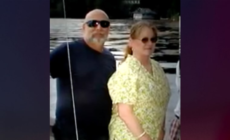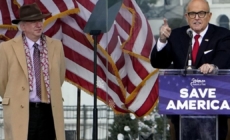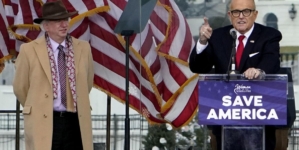-
Eagles vs. Commanders: NFC Championship Super Six bets | Bear Bets - 8 mins ago
-
Alex Bregman Favored To Land With AL Contender On $150 Million-Plus Deal - 30 mins ago
-
California man accused of beating his 62-year-old mother to death - 38 mins ago
-
Stakes are high for Newsom and California when Trump visits L.A. wildfires - 45 mins ago
-
Bills vs. Chiefs rivalry: Recapping every Josh Allen-Patrick Mahomes matchup - 51 mins ago
-
Woman Takes Son Out Of School Early To ‘Make Memories’ With Dying Dog - about 1 hour ago
-
Big banks hiked interest rates on borrowers but not for savers, senators say - about 1 hour ago
-
Pamela Ianetti was found dead with 47 stab wounds. Did she do it to herself? - about 1 hour ago
-
Hiltzik: John Eastman’s fealty to Trump could cost him - about 1 hour ago
-
Taken captive as a baby, Israelis brace to learn the fate of Hamasâ youngest hostage - 2 hours ago
California lawmakers are big on TikTok. What happens if Trump bans it?
When Assemblymember Alex Lee was sworn into office at age 25, he became the youngest state lawmaker in nearly a century. The self-described âZoomerâ from San JosĂ© started using TikTok in 2020 and now, five years later, he continues to reach voters on the app, distilling complicated policy issues into bite-sized clips.
The first openly bisexual state legislator in California, Lee has made posts supporting the LGBTQ+ community, along with explainers on legislation he wrote to ban the sale of anti-aging skin products to minors and the California special session to stabilize gas prices.
With a following that hovers at just under 1,300, Lee said that compared with his colleagues in Sacramento he is âmildly, vaguely successfulâ on the app. âIâm not that big of a TikTok star.â
But he also described how he uses it strategically, avoiding âthings that are cringeâ and anything that might risk getting him stereotyped as the Gen Z legislator.
âThereâs a way to dismiss the youngest member that makes you look unserious or childish, but Iâm very deliberate about it,â said Lee, who manages his account with the help of his small team. âThatâs also why I avoid the trendy stuff.â
The Supreme Court last week upheld a TikTok ban enacted by Congress due to national security concerns, and by Sunday users were blocked from the platform. A mere half-day later, President Trump gave the company a 90-day extension, leaving Lee and a small but growing group of California politicians who are active on the app wondering what comes next.
Sen. Scott Wiener, 54, a Democrat from San Francisco, counts just under 15,000 followers and has been mastering the art of getting videos to rack up views while also making what is sometimes dry policy digestible.
âTikTok really allows you as an elected official to connect with a lot of people youâre not connecting with otherwise,â he told The Times. At first, the senator and his team tried to jump on trends, but he soon pivoted to film direct-to-camera videos, a popular TikTok style.
âThose videos do well because people like authenticity,â he said. Some posts âflop,â he added, but the âbottom line is that TikTok is an extremely powerful platform to communicate with people.â
State Sen. Scott Wiener, a San Francisco Democrat, draws in thousands of views on his TikTok videos that range from policy to everyday issues.
(Office of California Sen. Scott Wiener)
Some U.S. lawmakers allege TikTok could be used by the Chinese government to gather data on Americans and fuel misinformation, a claim the company behind the short-form video app has vigorously denied. Trump, through an executive order, gave the company ByteDance three months to either sell the app or be banned.
Wiener said he understands the national security implications but argued a ban would be âtragicâ because it would censor a popular way to communicate.
Under a ban, Wiener said heâd probably pivot to Instagram. He has also been pondering hypotheticals. For instance: What happens if tech billionaire Elon Musk purchased TikTok?
âIâm worried heâd ruin TikTok like he did X,â Wiener said.
Countless U.S. officials from across the aisle, from local politics to the executive branch, have made their presence known on the app, including Trump, who has 15 million followers and used the app heavily on the campaign trail. Vice President JD Vance has 2.3 million followers, and U.S. Rep. Alexandra Ocasio-Cortez from New York has 1.6 million. Former U.S. Rep. Katie Porter amassed over half a million. The list goes on.
One federal lawmaker who voted against the TikTok ban last year, U.S Rep. Robert Garcia, a Democrat from Long Beach, has been posting on the app since 2022. From his perspective, the app isnât any more dangerous than other forms of social media.
âThere has to be a better way of looking at all of our social media platforms and being more equitable about how to make them safer,â Garcia said. âThere is nothing I have heard that makes me think TikTok is an imminent threat to national security.â
He has about 110,000 followers on TikTok, far more than on other platforms where he maintains a presence.
âTikTok is a great way for reaching folks,â Garcia said. âIt took a little time, but itâs been steadily growing. Iâve had some videos go viral.â
One of Garciaâs most popular videos has over 2.2 million views. The caption reads: âWhen you find out that you are the only Congressman that has to sit on the same three committees as Marjorie Taylor Greene,â with a backdrop of the congresswoman and the audio of a man crying, âno, no!â
Another viral clip shows Garcia on MSNBC in December saying, âwelcome to the Elon Musk presidency.â It has 2.5 million views.
Although dunking on political rivals is sometimes the aim, other lawmakers say the app is useful more as a way to engage with constituents and understand their needs.
Assemblymember Ash Kalra, a Democrat from San JosĂ© who uses TikTok, said he has âlearned a lotâ from the platform.
âEspecially with the horrific fires in Los Angeles, to see the firsthand experiences of people and to have that empathy,â he said. âIn that sense, it not only connects us to this human experience we share, but it gives a venue for ordinary people to vent their political viewpoints.â
U.S. Rep. Ro Khanna, a Democrat from Silicon Valley, voted against the TikTok ban and has used the platform over the last few weeks to collect signatures to stop the app from going dark. After four days, the video had almost 18 million views and the petition had collected over 1 million signatures. Khanna, who has amassed 200,000 followers on the app, has since introduced the âRepeal the TikTok Ban Actâ on Monday.
âThe fight continues,â Khanna said to the camera. âWe must make sure that this app never goes dark again.â

U.S. Rep. Ro Khanna, a Silicon Valley Democrat, voted against the TikTok ban and has grown a sizable following on the app.
(Rep. Ro Khanna)
His co-author, U.S. Sen. Rand Paul (R-Ky.), warned in a statement that shutting down TikTok would be the first step down a slippery slope.
âThey tell you this is about China. About security. About safety. Thatâs a lie. This is about control,â Paul said in a statement. âA government that can silence a platform, can silence a person. Today, itâs TikTok. Tomorrow, itâs your news.â
Oliver Haimson, an assistant professor at the School of Information and the Digital Studies Institute at the University of Michigan, is wary of what a ban will do to information access, especially for people under 24, who are a large portion of users.
âThis matters a lot for young people who are receiving news and learning about political candidates,â he said.
Haimson also has concerns that users will migrate to TikTokâs competitor, Instagram Reels, owned by Meta, which recently ended its fact-checking program. The platform will transition toward a crowd-sourcing method, similar to Muskâs approach with X.
âThat worries me,â Haimson said. âThey may be getting things that are not necessarily true.â
Source link





























